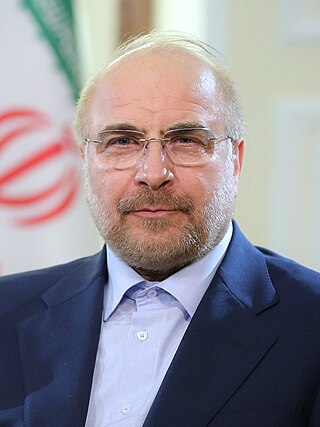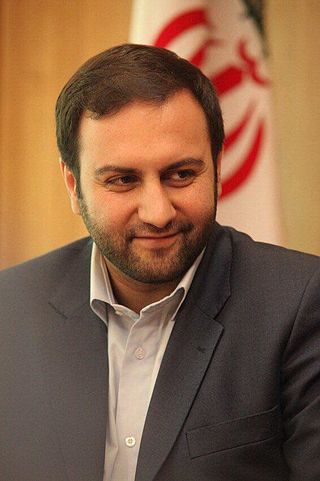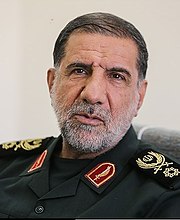
The Guardian Council is an appointed and constitutionally mandated 12-member council that wields considerable power and influence in the Islamic Republic of Iran.

The Islamic Consultative Assembly, also called the Iranian Parliament, the Iranian Majles or ICA, is the national legislative body of Iran. The Parliament currently consists of 290 representatives, an increase from the previous 272 seats since the 18 February 2000 election.

Ali Akbar Hashemi Bahramani Rafsanjani was an Iranian politician and writer who served as the fourth president of Iran from 1989 to 1997. One of the founding fathers of the Islamic Republic, Rafsanjani was the head of the Assembly of Experts from 2007 until 2011 when he decided not to nominate himself for the post. He was also the chairman of the Expediency Discernment Council.

Presidential elections were held in Iran 17 June 2005, with a second round run-off on 24 June. Mohammad Khatami, the outgoing president of Iran, stepped down on 2 August 2005, after serving his maximum two consecutive four-year terms according to the Islamic republic's constitution.

Mohammad Yazdi was an Iranian conservative and principlist cleric who served as the head of Judiciary System of Iran between 1989 and 1999. In 2015, he was elected to lead Iran's Assembly of Experts, defeating Akbar Hashemi Rafsanjani, a former president, by a vote count of 47 to 24.

Mohammad Bagher Ghalibaf or Mohammad Baqer Qalibaf is an Iranian conservative politician, former military officer, and current Speaker of the Parliament of Iran since 2020. He held office as the Mayor of Tehran from 2005 to 2017. Ghalibaf was formerly Iran's Chief of police from 2000 to 2005 and commander of the Revolutionary Guards' Air Force from 1997 to 2000.

The Islamic City Council of Tehran is the directly elected council that presides over the city of Tehran, elects the mayor of Tehran in a mayor–council government system, and budgets of the Municipality of Tehran.

The fourth Iranian Assembly of Experts election was held on 15 December 2006. The Assembly of Experts is a Council of 86 mujtahids that elect the Supreme Leader, and oversee his actions. The members of the Assembly are elected every eight years directly by the people of Iran.

Ayatollah Mohammad-Ali Movahedi Kermani is Tehran's Friday Prayer Ephemeral Imam and the former secretary-general of Combatant Clergy Association. He is also a member of the Assembly of Experts. He is a conservative and principlist politician.

Legislative elections for Majlis of Iran were held on 14 March 2008, with a second round held on 25 April 2008. Conservatives loyal to President Mahmoud Ahmadinejad were considered the victors of the election, at least in part because "all the most prominent" reformist candidates were disqualified from running.

Parliamentary elections were held in Iran on 8 April 1988, with a second round on 13 May. The result was a victory for leftist politicians who later emerged as reformists. The number of clerics elected to the Majlis was reduced by over a third.

The parliamentary election for the 9th Islamic Consultative Assembly, or Majlis, were held in Iran on Friday, 2 March 2012 with a second round on 4 May 2012 in those 65 districts where no candidate received 25% or more of the votes cast. More than 5,000 candidates registered but more than a third were disqualified by the Guardian Council leaving about 3,400 candidates to run for the 290 seat representing the 31 provinces.

Parliamentary elections were held in Iran on 26 February 2016 to elect members of the Islamic Consultative Assembly for all seats in the 10th parliament in the Islamic Republic era and the 34th since the Persian Constitutional Revolution. A second round was held on 29 April 2016 for some constituencies where candidates failed to obtain the required minimum 25 percent of votes cast. The elected MPs served from 28 May 2016 to 27 May 2020.
The Council for Coordinating the Reforms Front or the Reformist Front Coordination Council is the umbrella organization, coalition and council of main political groups within the Iranian reform movement. Since 2015, it is overseen by the Reformists' Supreme Council for Policy-making.
JAMA is an Iranian political party founded in 1964. The party which was mainly active between 1979 and 1981 and a junior partner in the Cabinet of Bazargan, had been outlawed throughout much of its history due to dissenting the rule of both Pahlavi dynasty and the Islamic Republic.

Legislative elections were held in Iran on 21 February 2020, four years after the previous legislative election in 2016. Due to the COVID-19 pandemic in Iran, the second round, to elect eleven seats, was postponed until 11 September 2020.

Mohsen Pirhadi, is one of the representatives of the people of Tehran in the Islamic Consultative Assembly who is an observer and member of the presidium of the 11th parliament and the managing director of Resalat newspaper. This Iranian Shia Twelver principlist representative was a member and secretary of the fourth term of Tehran City Council (2013-2017), which was on the list of "settlers of Islamic Iran" in the elections of this term. In the elections of the 11th term of the Islamic Consultative Assembly, he finally entered the Islamic Consultative Assembly and was on the unity list of Mohammad Bagher Ghalibaf at the mentioned elections.
A by-election for the Islamic Consultative Assembly's constituency Tehran, Rey, Shemiranat and Eslamshahr was held on 15 December 2006, to fill two vacancies caused by resignation of Davoud Danesh-Jafari and Manouchehr Mottaki, who were appointed as finance and foreign ministers respectively. The voters in Tehran cast their ballots along with the nationwide Assembly of Experts election and the Tehran City Council election.
A by-election for the Islamic Consultative Assembly's constituency Tehran, Rey, Shemiranat and Eslamshahr was held on 8 June 2001, to fill the vacancy caused by resignation of Akbar Hashemi Rafsanjani after he had won in the election held the previous year. The voters in Tehran cast their ballots along with the 2001 Iranian presidential election.

In the total 11 terms of the Parliament of the Islamic Republic of Iran, 78 women have won 111 seats in various terms. Some of these women were subsequently disqualified by the Guardian Council, some failed to win the necessary votes to re-enter parliament, some were imprisoned or left Iran, and others are still seeking re-election to the parliament. There are 16 women from 13 constituencies in the current term of the parliament of Iran.

















